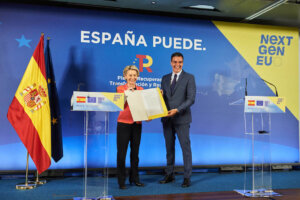 Travellers flying to Alicante-Elche Airport can now take advantage of a new tool launched by Spain’s tourism authority. Incorporated within Turespaña’s “Travel Safe” microsite for international tourists planning Spanish trips, the tool (currently available in Spanish, English, German and French) enables holidaymakers to consult COVID-19 travel restrictions and entry and exit requirements from 50 countries.
Travellers flying to Alicante-Elche Airport can now take advantage of a new tool launched by Spain’s tourism authority. Incorporated within Turespaña’s “Travel Safe” microsite for international tourists planning Spanish trips, the tool (currently available in Spanish, English, German and French) enables holidaymakers to consult COVID-19 travel restrictions and entry and exit requirements from 50 countries.
According to the Spanish government – which this week received formal approval for multi-billion-euro EU funding as part of the country’s “Recovery and Resilience Plan – the main aim is to help tourists plan and organise safe travel arrangements for Spain, before, during and following their trip.
Update of Digital Experience at Alicante-Elche Airport
Passengers at Alicante-Elche Airport also now have access to enhanced online services provided by the national airport operator. Aena revamped its website for travellers flying in and out of Alicante-Elche and other airports around Spain to ensure that services can be accessed with just one click.
According to Aena, the objective is to satisfy passengers’ evolving digital demands, with a “responsive and user-centred” website that is accessible and adaptable for tablets, mobile phones and computers. The contents have also been optimised and the site has been designed to display “more intuitive and simplified” pages that integrate the operator’s market places, including Aena Travel and Food to Fly.
Incorporated into the website is the www.infocovidaena.com microsite, which offers passengers updated information about safety measures implemented at Aena airports, recommendations and protocols for travelling (before heading to the airport, once at the terminal, on the plane and at the destination airport), and any flight restrictions – with links to other pages of interest.
Official Approval for EU Digital COVID Certificate
Meanwhile, the EU Digital COVID Certificate is now set to go live on 1 July after all three EU institutions – European Parliament, European Commission and Council of the EU – officially signed off on one of this summer’s most important travel initiatives.
The end of the legislative process was confirmed at a press conference by Ursula von der Leyen, president of the European Commission, Portuguese prime minister Antonio Costa (rotating president of the EU Council) and David Sassoli, president of the European Parliament.
In a statement released later, the European Commission declared, “The EU Digital COVID Certificate is a symbol of what Europe stands for. Of a Europe that does not falter when put to the test. A Europe that unites and grows when faced with challenges. Our Union showed again that we work best when we work together. The EU Digital COVID Certificate Regulation was agreed between our institutions in the record time of 62 days. While we worked through the legislative process, we also built the technical backbone of the system, the EU gateway, which is live since 1 June.”
According to the commission, the EU Certificate “will again enable citizens to enjoy this most tangible and cherished of EU rights – the right to free movement. Signed into law today, it will enable us to travel more safely this summer. Today we reaffirm together that an open Europe prevails. All Europeans have the right to free movement, also without the certificate, but the certificate will facilitate travel, exempting holders from restrictions like quarantine.”
The regulation will formally enter into application on 1 July, with a phasing-in period of six weeks for issuing certificates for any member states that need additional time.
Pictured: During a tour of European capitals to announce approval of “Recovery and Resilience” financing as part of the NextGenerationEU initiative, as well as discussing ongoing COVID-19 protocols such as the EU Digital COVID Certificate, European Commission president Ursula von der Leyen met with Spanish prime minister Pedro Sánchez in Madrid. (Photo © European Union, 2021)
